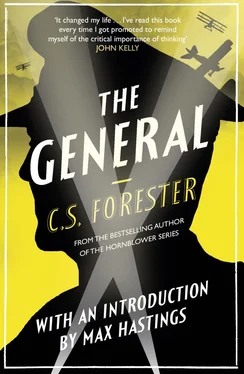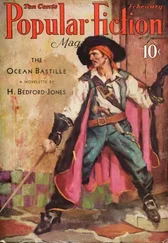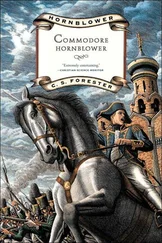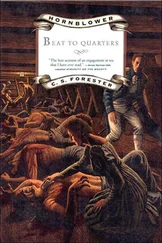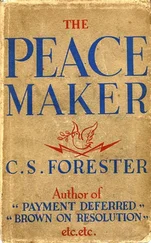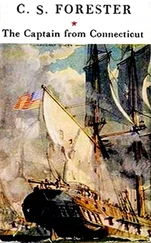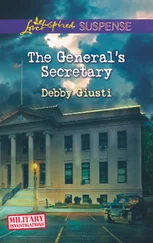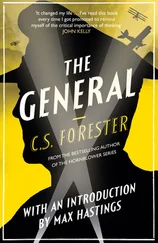It was in this climate that C.S. Forester, then emergent as one of the most popular novelists of his generation, wrote The General . The author, whose real name was Cecil Louis Troughton Smith, was born in Cairo in 1899, son of a minor government official. Educated at Dulwich College, he was rejected for military service in 1917 on grounds of poor eyesight and general physical frailty. He spent three years as a medical student before abandoning this path in 1921 to pursue a writing career. Success came relatively slowly; only in 1926, after publishing several deservedly unnoticed pieces, did Forester win attention for Payment Deferred , a novel about a man who murders his rich nephew and escapes consequences until his wife exacts an ironic but appropriate penalty. The book caught the eye of Charles Laughton, who embraced it as a star vehicle for himself in highly successful stage (1931) and film (1932) versions, which also propelled its author towards fame and prosperity.
Forester thereafter displayed versatility as well as high gifts as a storyteller, penning histories and historical novels which achieved a worldwide audience, while also serving as a Hollywood scriptwriter. His books focused upon the nineteenth and twentieth centuries, with a special emphasis on naval yarns, of which the first was Brown on Resolution (1929), a superbly accomplished, wry tale about Albert Brown, a sailor whose short life climaxes on a barren Pacific islet in 1914 after he has become sole survivor of his old British warship’s encounter with a German raiding cruiser. The African Queen (1935), which later became a movie starring Humphrey Bogart and Katharine Hepburn, wove a quirky love story around one of the lesser-known episodes of World War I, the Royal Navy’s December 1915 sinking of a German gunboat on Lake Tanganyika. Other early novels were set in the Napoleonic Wars, to which the author would return for the 1937 creation of Captain Horatio Hornblower, the character with whom his memory remains most famously associated, favoured leisure reading of Winston Churchill in World War II.
But Hornblower still lay in the future when Forester wrote The General , which more than a few admirers, myself and the author among them, believe to have been his best work. In all his writing he displayed a fascination with awkward human beings, unglamorous figures who nonetheless achieved notable deeds, some base, others heroic. By 1936, when the book was first published, a growing minority of British people feared that it would prove necessary once more to fight Germany, this time under Hitler, making mock of the post-1918 slogan ‘Never again.’ For a season, however, the Peace Movement and its collateral branch, the appeasers, still held sway. Abomination of the Western Front’s generals had not reached the peak it would achieve thirty years later, and has since retained, but there was assuredly revulsion towards the bloodbaths which the ‘brass hats’ had directed.
Captain Basil Liddell Hart, who served briefly and without attracting much notice on the Western Front, had transformed himself into a widely read pundit on military affairs. In this role he did much to advance the legend of British command idiocy, initially through his 1930 study The Real War , later extended and republished as A History of the World War (1914–1918) . Sir Hew Strachan has written that the book ‘posed as an objective analysis of military operations. In truth it is a sustained critique of the British high command, and its purpose is more didactic than historical.’
Liddell Hart was prejudiced, if not embittered, by the unwillingness of the British Army’s senior officers to treat himself as seriously as he believed his gifts as a strategic thinker merited. He was a fluent writer who sustained a prodigious output of journalism, books and correspondence. He developed some good and even important ideas which, like most theoreticians, he habitually overstated. Foremost among them was the claim that exploitation of manoeuvre and technology – most conspicuously, the tank – could have played a game-changing role earlier in the First World War, and would certainly do so in future conflicts, without the necessity for murderous headlong collisions.
Liddell Hart’s denunciations of 1914–18 commanders’ myopia, and assertions of their culpability, won favour with some important people, including Lloyd George, Winston Churchill – and C.S. Forester. The strategic guru’s vision pervades the novelist’s tale about an officer who rises to high rank in the First World War. Forester was encouraged to write it by Michael Joseph, a flamboyant and gifted publisher. Joseph, born in 1897, had served on the Western Front as an officer in the Machine-Gun Corps, being badly gassed before coming home to marry – briefly – the actress Hermione Gingold. In 1936 he had just started his own publishing house, which thereafter midwifed all Forester’s work. The author inscribed The General to him ‘not as the “onlie begetter”, but nearly so’. On 2 January, Joseph wrote to Basil Liddell Hart, asking him to read and comment upon Forester’s proofs. The pundit responded that he was immensely busy, but could not resist a book by an author whom he did not know personally, but much admired.
On 8 January he wrote at length, saying that having finished The General he was impressed, and would make no proposals for major changes: ‘It is so true a picture, with so telling a message, that I feel nothing ought to be risked that might dim it.’ He added a list of twenty detailed comments and corrections – a cavalry regiment had three sabre squadrons, not four; a corps never contained more than three divisions; Sir John French was sacked as C-in-C of the BEF in December, not October 1915, and suchlike. Cajoled by Michael Joseph, Liddell Hart also provided a pre-publication ‘puff’ for the book: ‘It is superb … in its combination of psychological exposure and balance.’ Forester and Liddell Hart met early in 1937, the first encounter of what became a close and mutually admiring friendship. On the novelist’s death in 1966 the military commentator was among those to whom he left legacies of $1,000 apiece as tokens of esteem.
Forester starts the portrait of his hero, or anti-hero, with one of the more droll first sentences in fiction: ‘Nowadays Lieutenant-General Sir Herbert Curzon, KCMG, CB, DSO, is just one of Bournemouth’s seven generals, but with the distinction of his record and his social position as a Duke’s son-in-law, he is really far more eminent than those bare words would imply.’ The author set himself to understand and explain what manner of man could have done as the commanders of 1914–18 did: launch repeated doomed assaults that killed their own troops in tens of thousands, some before they reached the British front line, never mind the German one.
Before I took my wife on a first visit to the battlefields of the Western Front, I recommended The General as background reading ahead of any work of history, and she devoured it eagerly. To appreciate Forester’s book, no grasp of strategic studies is necessary. This is pre-eminently a human story, enhanced by its bathetic romance between a tongue-tied, socially corseted cavalryman on the wrong side of forty and a duke’s unhappy and unlovely spinster daughter: ‘for a fleeting moment Curzon, as his eyes wandered over her face, was conscious of a likeness between her features and those of Bingo, the best polo pony he ever had’. The author writes sympathetically about the sexual problems which dogged so many marital relationships in those ignorant, if not innocent, days. Above all, he tells the story of a wartime officer’s rise from obscurity to arbitration of the destinies of 100,000 men – which, as the author remarks, were more than Marlborough or Wellington ever commanded.
Читать дальше
